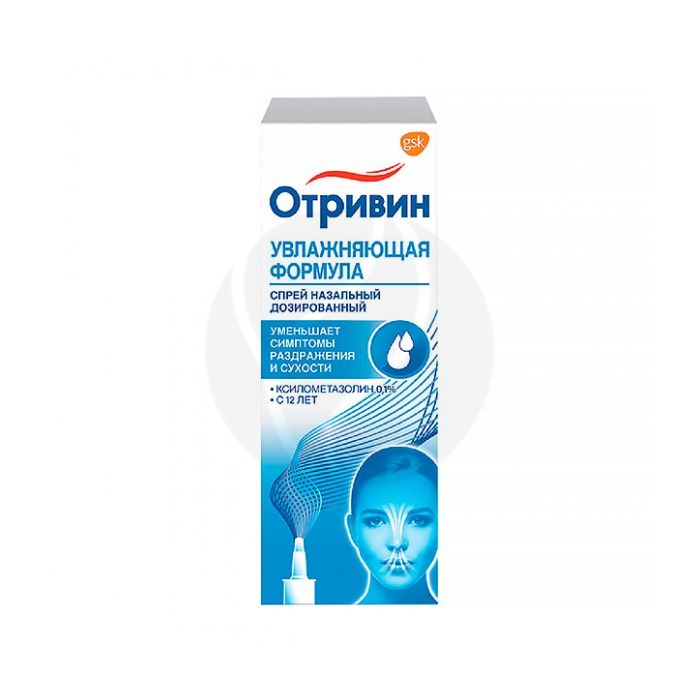Otrivin spray 0.1%, 10ml
Expiration Date: 11/2025
Russian Pharmacy name:
Отривин спрей 0,1%, 10мл
- Acute respiratory diseases with symptoms of rhinitis (rhinitis);
- acute allergic rhinitis, hay fever, sinusitis, eustachitis, otitis media (to reduce swelling of the nasopharyngeal mucosa);
- preparation of the patient for diagnostic manipulations in the nasal passages.
Intranasally.
Nasal spray, 0.1%. Adults and children over 12 years old - 1 injection into each nasal passage 3 times a day. Should not be used more than 3 times a day.
Nasal spray, 0.05%. Children from 6 to 11 years old - 1-2 injections into each nasal passage 2-3 times a day; from 2 to 5 years - 1 injection into each nasal passage 1-3 times a day. Should not be used more than 3 times a day. The drug in children should be used under adult supervision.
1 ml of the drug contains:
Active ingredient: xylometazoline hydrochloride 1 mg
Excipients: sodium dihydrogen phosphate dihydrate - 5 mg, sodium hydrogen phosphate dodecahydrate - 1.7 mg, disodium edetate - 0.5 mg, benzalkonium chloride 50% solution - 0.1 mg (in terms of benzalkonium chloride - 0.05 mg), sorbitol 70% - 20 mg, hypromellose 4 thousand - 5 mg, sodium chloride - 4 mg, purified water - up to 1 ml. '
-Hypersensitivity to the components of the drug;
-arterial hypertension;
-tachycardia;
- severe atherosclerosis;
-glaucoma;
-atrophic rhinitis;
- hyperthyroidism;
- condition after transsphenoidal hypophysectomy;
-surgical interventions on the meninges (in history);
-Children under 2 years old (for a spray of 0.05%) and up to 12 years (for a spray of 0.1%).
With care: diabetes mellitus; CVS diseases (including ischemic heart disease, angina pectoris); hyperplasia of the prostate; hypersensitivity to adrenergic drugs, accompanied by insomnia, dizziness, arrhythmia, tremor, increased blood pressure.
Otrivin Moisturizing Spray is used for respiratory diseases with symptoms of rhinitis (runny nose) *:
Х Helps to fight nasal congestion thanks to the active ingredient - xylometazoline.
Х Moisturizing formula helps to reduce symptoms of irritation and dryness of the nasal mucosa.
Х Relieves congestion after 2 minutes, maintaining the effect for up to 12 hours *.
pharmachologic effect
Xylometazoline has an alpha-adrenomimetic effect: it causes a narrowing of the blood vessels of the nasal mucosa, eliminating edema and hyperemia of the nasopharyngeal mucosa. Xylometazoline also reduces concomitant mucus hypersecretion and facilitates drainage of blocked nasal passages and thus improves nasal breathing in case of nasal congestion.
OtrivinЃ is well tolerated by patients with sensitive mucous membranes; its effect does not prevent mucus separation. OtrivinЃ has a balanced pH value characteristic of the nasal cavity.
The menthol and eucalyptol contained in the preparation have a cooling effect on the nasal mucosa, giving a feeling of freshness.
In therapeutic concentrations, the drug does not irritate the mucous membrane, does not cause hyperemia.
The effect occurs 2 minutes after application and lasts for 12 hours.
In vitro studies have shown that xylometazoline in humans inhibits the infectious activity of the rhinovirus that causes the 'cold'.
Pharmacokinetics
When applied topically in recommended doses, it is practically not absorbed, plasma concentrations are below the detection limit.
Side effect
From the immune system: very rarely - hypersensitivity reactions (angioedema, rash, itching).
From the nervous system: often - headache; rarely - insomnia, depression (with prolonged use in high doses).
From the senses: very rarely - a violation of the clarity of visual perception.
From the side of the cardiovascular system: rarely - a feeling of palpitations, increased blood pressure; very rarely - tachycardia, arrhythmia.
From the respiratory system: often - irritation and / or dryness of the nasopharyngeal mucosa, burning, tingling, sneezing, hypersecretion of the nasopharyngeal mucosa.
From the digestive system: often - nausea; rarely - vomiting.
Local reactions: often - burning at the site of application.
If any of the above side effects are aggravated, or the patient has noticed any other side effects, he should inform the doctor about it.
Application during pregnancy and lactation
The drug should not be used during pregnancy.
During lactation, use is possible only under the supervision of a physician and after a careful assessment of the risk / benefit ratio for the mother and the fetus. Do not exceed the recommended dose.
Application in children
Contraindicated in children under 12 years of age.
Use in elderly patients
The recommended dose and duration of the drug should not be exceeded, especially in elderly patients.
special instructions
It is not recommended to use continuously for more than 10 days.
The recommended doses should not be exceeded, especially in children and elderly patients.
Long-term (more than 10 days) or excessive use of the drug can cause a 'rebound' effect (rhinitis medicamentosa) and / or atrophy of the nasal mucosa.
Influence on the ability to drive vehicles and mechanisms
Xylometazoline does not affect the ability to drive or use machinery.
Overdose
Symptoms: xylometazoline, when applied topically in an excessive dose or if accidentally ingested, can cause severe dizziness, increased sweating, a sharp drop in body temperature, headache, bradycardia, increased blood pressure, respiratory depression, coma and convulsions. Following an increase in blood pressure, a sharp decrease can be observed.
Treatment: Appropriate supportive measures should be taken with any suspicion of an overdose, in some cases, immediate symptomatic treatment is indicated under the supervision of a physician. These measures should include monitoring the patient for several hours. In the case of severe poisoning with cardiac arrest, resuscitation should last at least 1 hour.
Drug interactions
Xylometazoline is contraindicated in patients who are currently receiving MAO inhibitors or have received them within the previous 2 weeks.
The simultaneous use of tri- or tetracyclic antidepressants and sympathomimetic drugs can lead to an increase in the sympathomimetic effect of xylometazoline, so this combination is recommended to be avoided.

